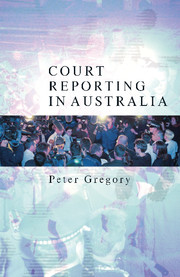Book contents
- Frontmatter
- Contents
- Figures and Tables
- Acknowledgments
- Introduction
- Chapter 1 The Court System: An Overview
- Chapter 2 Gaining Information
- Chapter 3 Contempt
- Chapter 4 Defamation
- Chapter 5 Writing the (Newspaper) Story
- Chapter 6 Subediting and Photography
- Chapter 7 Television and Radio
- Chapter 8 Human Relations and Ethics
- Chapter 9 An Atypical Friday at Court
- Chapter 10 Suppression Orders
- Chapter 11 Future Directions and Issues
- Bibliography
- Index
Chapter 10 - Suppression Orders
Published online by Cambridge University Press: 22 September 2009
- Frontmatter
- Contents
- Figures and Tables
- Acknowledgments
- Introduction
- Chapter 1 The Court System: An Overview
- Chapter 2 Gaining Information
- Chapter 3 Contempt
- Chapter 4 Defamation
- Chapter 5 Writing the (Newspaper) Story
- Chapter 6 Subediting and Photography
- Chapter 7 Television and Radio
- Chapter 8 Human Relations and Ethics
- Chapter 9 An Atypical Friday at Court
- Chapter 10 Suppression Orders
- Chapter 11 Future Directions and Issues
- Bibliography
- Index
Summary
The right to publish is not absolute. Governments and courts assert free speech, but the right to attend and report in open courts must be balanced with other rights in deciding whether non-publication, or suppression, orders will be granted. Judges have made it clear that suppression is the exception, not the rule, a point that should be made to every judicial officer considering limits on publication. In 2003, Justice Geoffrey Nettle made comprehensive suppression orders in a damages claim brought against the then Governor-General, Dr Peter Hollingworth. A woman alleged that Dr Hollingworth raped her in the 1960s, when she was 19 or 20. She committed suicide after bringing the action, and the case was dismissed, her lawyers conceding it would be virtually impossible to prove the allegation.
Despite the orders, news leaked to Federal Parliament and the government was asked whether Dr Hollingworth had that year initiated legal proceedings for suppression orders. He had not – the suppression was requested on the woman's behalf – but Dr Hollingworth's lawyers asked the court to lift the suppression, and he defended himself in a recorded television appearance and two-page statement. The case involved a number of competing interests. The woman had the right to prosecute her claim, Dr Hollingworth had the right to defend it, and the public had a legitimate interest in knowing if the country's head of state was facing serious allegations.
- Type
- Chapter
- Information
- Court Reporting in Australia , pp. 164 - 172Publisher: Cambridge University PressPrint publication year: 2005



